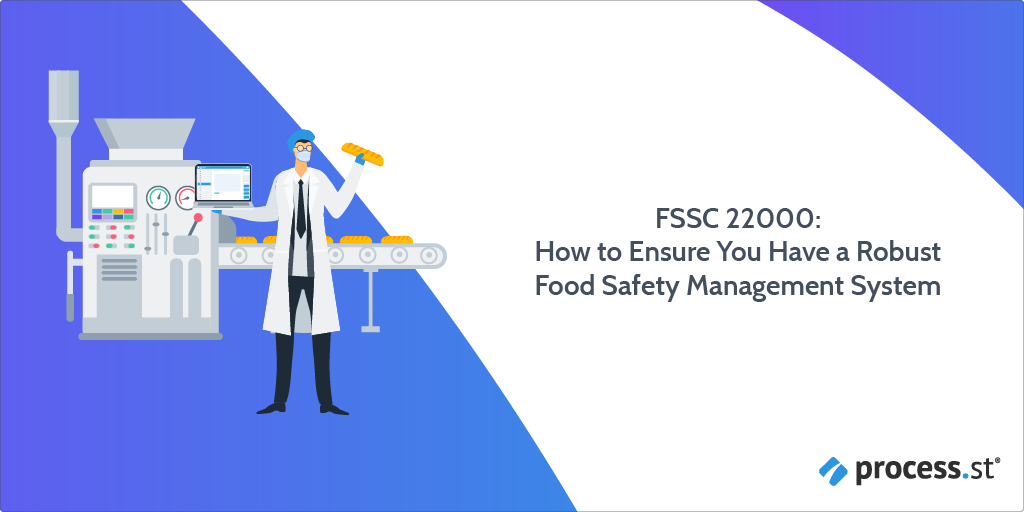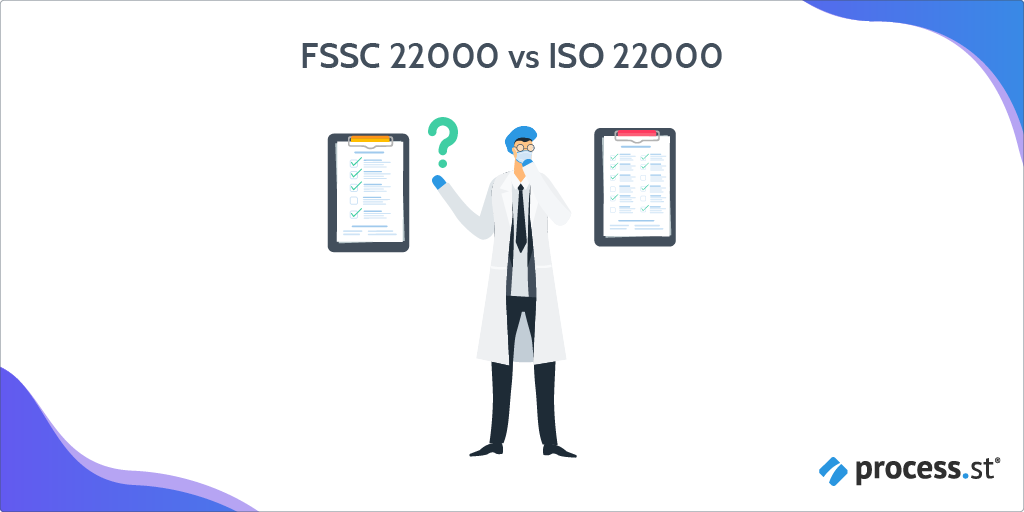
Bread. Beer. Bacon. *Homer Simpson voice* Mmm, bacon…
No matter what tasty food product your business is creating (or helping to create), a robust food safety management system is essential.
Why?
Because without one, you could be exposing your food to risks and hazards that are both life-threatening for your consumers (420,000 people die each year due to contaminated foods), and business-destroying for you. Plus, by not having a food safety management system in place, you’ll lose pivotal trade opportunities with others in the food industry.
To ensure you have a food safety management system in place – and that it’s up to scratch – there’s FSSC 22000.
In this post, you’ll discover what FSSC 22000 actually is, why it’s so important, how a GFSI recognized certification will benefit you, and how Process Street can help with it all.
Make your way through the following sections to get clued up:
- What is FSSC 22000?
- What’s the difference?: FSSC 22000 vs ISO 22000
- What a GFSI recognized certification means for you
- The additional positives of FSSC 22000 certification
- Achieve FSSC 22000 certification with Process Street!
Now, it’s time to taco about FSSC 22000 and food safety!
What is FSSC 22000?
FSSC stands for food safety system certification. FSSC 22000 is a company-level framework and certification created by the Foundation for Food Safety Certification. The framework is based on defined International Organization for Standardization standards (specifically, ISO 22000) but is wholly different as it includes other, additional steps.
By achieving FSSC 22000 certification, it shows fellow businesses (suppliers, buyers, etc) that your food safety management system meets the requirements for ensuring the safe supply of drinks and food.
For a quick glimpse into what’s involved with the framework and certification (you’d be here for the best part of today if we were to go through it step by step), read this list from the International Food Safety & Quality Network:
- Management of services
- Supervision of personnel
- Management of supplied materials
- Management of natural resources (for animal production only)
- Food defense
- Food fraud prevention
- Formulation of products (only for pet food for dogs and cats)
- Management of allergens
- Product labelling
- Environmental monitoring
- Logo use
– The International Food Safety & Quality Network, What is FSSC 22000 Certification?
Now, a business can’t claim to be FSSC 22000 certified themselves.
A licensed third-party has to come in and assess whether the business’ processes and systems are following FSSC 22000 rules.
To boot, FSSC 22000 certification isn’t a one-off – businesses are re-audited regularly (annually, in most cases) to ensure they’re remaining FSSC 22000 compliant.
What is a food safety management system?
If you aren’t sure of what a food safety management system means precisely – or what it consists of – let me clarify.
A food safety management system (often written as the acronym FSMS) is a collection of processes that make sure all foods and drinks produced are safe for consumption. Legally, businesses are required to implement and sustain a food safety management system, otherwise, businesses in the food sector would pose a grave threat to the health of their customers and consumers, as mentioned at the beginning of this post.
Basically, think of the food safety management system as a myriad of safety processes, and the FSSC 22000 as the stamp of approval for the overall food safety system!
What’s the difference?: FSSC 22000 vs ISO 22000

If your business is looking to be FSSC 22000 certified and you’ve already done some research, chances are that you’ll have seen ISO 22000 mentioned alongside FSSC 22000.
That’s because FSSC 22000 and ISO 22000 have a lot of similarities and overlap, but they’re also substantially different.
What? Why? How?
Let’s start from the top.
ISO 22000 provides the requirements for a food safety management system in the eyes of ISO, the International Organization for Standardization.
For insight into what an ISO structure looks like, check out the ISO 9000 Structure Template below.
And for internal audits, take a look at this ISO 9001 Internal Audit Checklist for Quality Management Systems template. (It could give you ideas on how to internally audit your systems, whether they’re trying to comply with ISO or another type of industry standard.)
However, ISO 22000 in particular is broad in scope. This means while it’s a great beginning step for deploying a food safety management system and showing customers that a system is in place, the broadness means ISO 22000 isn’t a benchmarked standard for GFSI, the Global Food Safety Initiative.
In this quote, the Safe Food Alliance masterfully explain who the GFSI are and what they do:
“GFSI stands for The Global Food Safety Initiative. It is a business-driven initiative for the development of food safety management systems to ensure food facilities are processing safe food for consumers.
The GFSI is a private organization that oversees and approves different auditing platforms as meeting their criteria. This criterion provides a universal gold-standard of recognition to specific food safety audits.
In practice, this means that a food processor or manufacturer who can point to their GFSI certification can effectively and immediately show their customers and potential customers that their plant is operating with a structured, comprehensive, and effective food safety program.
In dollars and cents, this means that if you want to reach new customers and keep existing customers, a GFSI audit and GFSI Certification will help them to know that they aren’t likely to face food safety problems with your product.” – Safe Food Alliance, What is GFSI and how do I get started?
To prove that GFSI is indeed seen as the gold-standard in food safety auditing, some of the biggest food retailers in the world – including Walmart, Tesco, Carrefour, and Ahold Delhaize – accepted the GFSI benchmarked food safety schemes all the way back in the mid-2000s. Ever since, they’ve worked with those whose food safety management systems are recognized by the GFSI.
With all this in mind, if you’re in the food industry, you wouldn’t want to not have your food safety management system recognized and approved by the GFSI – which is where FSSC 22000 comes in.
Simply put, FSSC 22000 is largely based on the already-established ISO 22000 requirements. But so FSSC 22000 is recognized by food-focused groups such as the GFSI, there are additional, more extensive steps included. This makes FSSC 22000 more rigid in scope, but it’s a positive thing in this instance, rather than a negative.
For those who didn’t have time to read through the above paragraphs, here’s a summarized, TL;DR version:
- FSSC 22000 is based off ISO 22000 and follows the majority of the requirements
- FSSC 22000 contains additional requirements so it’s recognized by groups whose primary focus is food safety
- ISO 22000 is not recognized by the GFSI
- FSSC 22000 is recognized by the GFSI
If you’re still wondering if it’s important to graduate from ISO 22000 to FSSC 22000, or if you should go straight to following FSSC 22000 requirements, the next section will explain why you should. ⬇️
What a GFSI recognized certification means for you
Seeing as the FSSC 22000 certification is recognized by the GFSI, going for FSSC 22000 rather than ISO 22000 certification means reaping rewards you wouldn’t otherwise be able to, well, reap.
For all businesses operating in the food industry – from farm to fork – I’m sure this is music to your ears.
So without further ado, let’s dive in.
The benefits from the GFSI recognized FSSC 22000 certification include:
- Increased reputation.
- New trade opportunities.
- Access to international markets.
- Strengthened supply chain. ⛓
The world of business is tough. That’s why when you’re competing against others – whether it’s for a retailer to buy your product or gaining a new partner in your supply chain – you need something that’ll give you that competitive advantage. The GFSI recognized FSSC 22000 certification does exactly that, as it shows you’re committed to food safety processes and systems, thereby increasing your local, national, and international reputation!
Growth is incredibly important — in fact, it’s completely and utterly necessary – for your business to survive in the long run. Luckily, by holding a GFSI recognized certification, doors will open for you. By this, I mean you can tackle new markets within the food industry, as well as creating partnerships with those who are assured by your business having the certification.
Armed with the certification, you can take the world by storm. And when I say the world, I really do mean it. For instance, FSSC 22000 is the largest GFSI recognized standard in China for food safety. If you’re wanting to trade inside China – or any other leading nation that acknowledges the importance of FSSC 22000 – having the FSSC 22000 certification under your business’ belt is certainly a positive.
In the first bullet point, I mentioned how an increased reputation can help you gain new partners in your supply chain. While this is certainly true, it can also improve the relationship and increase loyalty with your existing supply chain partners, meaning a strengthened supply chain from beginning to end.
Impressive list, right?
The positives don’t end there, however.
Take a look at the next section to learn more…
The additional positives of FSSC 22000 certification
There are additional positives that come from FSSC 22000 that aren’t as directly related to it being GFSI recognized, like the above benefits are.
Let’s take a few minutes to fully understand the other, more general, more internal positives of having the FSSC 22000 certification!
- Doubled-down food safety management system.
- Proper process documentation.
- Saved costs.
- Improved processes and procedures.
Although it’s been mentioned previously in this post, it’s worth mentioning again: Both ISO 22000 and FSSC 22000 (but FSSC 22000 more so) help businesses in the food sector to double-down on their food safety management systems, bringing them up to a global standard. This leads to further opportunities for the business in question, while also reassuring and instilling truth in their customers and consumers. Doubling-down? It’s a double win.
When building out, implementing, and sustaining a robust food safety management system, it’s critical to document your food safety management processes. If you document business processes, you can ensure that processes are followed by all employees, that they never go about a process incorrectly and make mistakes along the way, and that new employees and/or partners can learn the processes quickly.
For the money-minded (read: everyone who’s involved with business), following the FSSC 22000 framework and getting certification results in saved costs across the board. Why? Because by optimizing your food management safety system and the associated processes, you’re able to stop or change poorly optimized processes that are causing you to shell out extra money, rather than save money.
By doubling-down on your food safety management system, documenting processes, and then optimizing your processes, this naturally leads to improved processes and procedures across the board. If you’re wondering why improved processes and procedures are so pivotal, let me summarize as succinctly as possible: Improved processes save you time, money, and unnecessary labor. They can even boost business success by 70%.
Speaking of improved processes, there just so happens to be a nifty BPM tool that’ll help you create, document, and follow the recurring processes that are part of your food safety management system properly – and in an agile way.
The name of this handy business software?
Achieve FSSC 22000 certification with Process Street!
Process Street is superpowered checklists.
With our state-of-the-art BPM software, you document workflows, business processes, and integral procedures as templates. Then, whenever you or another person needs to follow an important process, a checklist is launched from that template.
For a visual explainer, check out the video below.
In terms of how you can use Process Street for your food safety management system, you can utilize Process Street for, well, all of it!
All your FSMS processes – from food defense measures to food fraud prevention processes, and the management of natural resources to the management of personnel involved – can be created as checklist templates.
To do so, all you need to do is sign up for free, then get creating the processes in line with FSSC 22000’s framework.
It’s as simple as that.
What makes Process Street particularly useful is its workflow automation features.
These include (but aren’t limited to):
- Stop tasks ✋
- Dynamic due dates ⏱
- Conditional logic
- Task permissions
- Task assignments
- Role assignments
- Webhooks
- Embed widget
- Approvals ✅
These integrated workflow features help to automate and improve your essential processes – for the better.
For instance, stop tasks ensure order as users can’t progress to the next step without completing the task at hand. Task permissions, meanwhile, allow only certain people to view tasks in a checklist, making it a great option for hiding sensitive data or information.
For a deep dive into some of these features, check out the webinar below.
More resources for getting systems, processes, and certifications like FSSC 22000 in check
Where would businesses be without solid systems and processes?
Not in a good place, that’s for sure.
That’s why, if you’re looking to build out your systems and processes correlating to FSSC 22000 – or perhaps another framework or standard – we’ve got a plethora of resources for you to jump into.
Starting off, here’s a reading list to help with systems, processes, automation, and the supply chain:
- What is an SOP? 16 Essential Steps to Writing Standard Operating Procedures
- 20 Free SOP Templates to Make Recording Processes Quick and Painless
- How Processes Protect Your Business From Crashing and Burning
- Implementing Processes: How to Boost Success Rate by 70%
- Business Process Documentation: 5 Benefits and Why You Should Use It
- 9 Benefits of Business Process Management (BPM) and Why You’ll Love It
- The Complete Guide to Business Process Management
- 50 Ways To Save Time & Money with Workflow Automation
- 222 Zaps to Crush Your Current Process Automation
- 8 Logistics Management Processes to Perfect Your Supply Chain
- How to Support €38.8 Billion Revenue: Tips from IKEA’s Supply Chain
- How to Build a Better Purchase Order Workflow with Process Street
- 8 Tips to Improve Your Company’s Shipping Processes
Additionally, we have a whole host of ISO-focused articles. There are a lot more of them on our blog, but these articles are some of the most important:
- What is ISO 9000? The Beginner’s Guide to Quality Management System Standards (Free ISO 9001 QMS Template)
- What is ISO 9001? The Absolute Beginner’s Guide (Free Templates!)
- What is ISO 9001 Certification? How to Get Certified (For Beginners)
- What is Quality Management? The Definitive QMS Guide (Free ISO 9001 Template)
- Agile ISO: How to Combine Compliance with Rapid Process Improvement
We also have a collection of ISO templates, like the previously mentioned ISO 9000 Structure Template!
Click here to get the ISO-9000 Structure Template.
There you have it.
You’ve learned all about FSSC 22000, how it differs from ISO 22000, and the positives FSSC 22000 certification can bring. With these free resources and your new, shiny account for Process Street’s checklist app, there’s no reason why your business can’t become FSSC 22000 certified!
Is your business FSSC 22000 certified? Are there any tips and tricks you’d like to share with the Process Street community? If so, write them in the comment section below.









Thom James Carter
Thom is one of Process Street’s content writers. He’s also contributed tech-related writing to The New Statesman, Insider, Atlassian, G2, The Content Marketing Institute, and more. Follow him on Twitter @thomjamescarter.